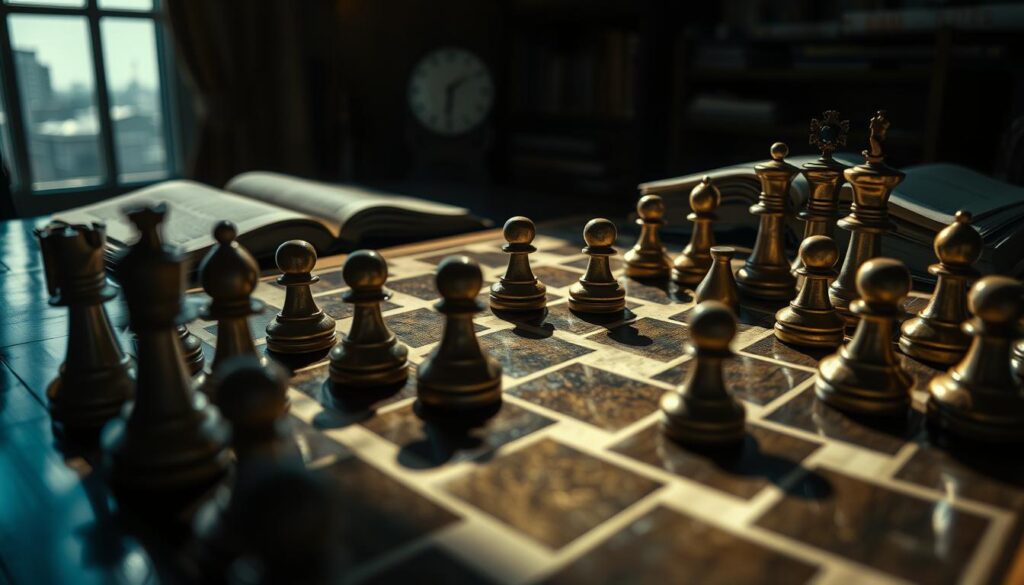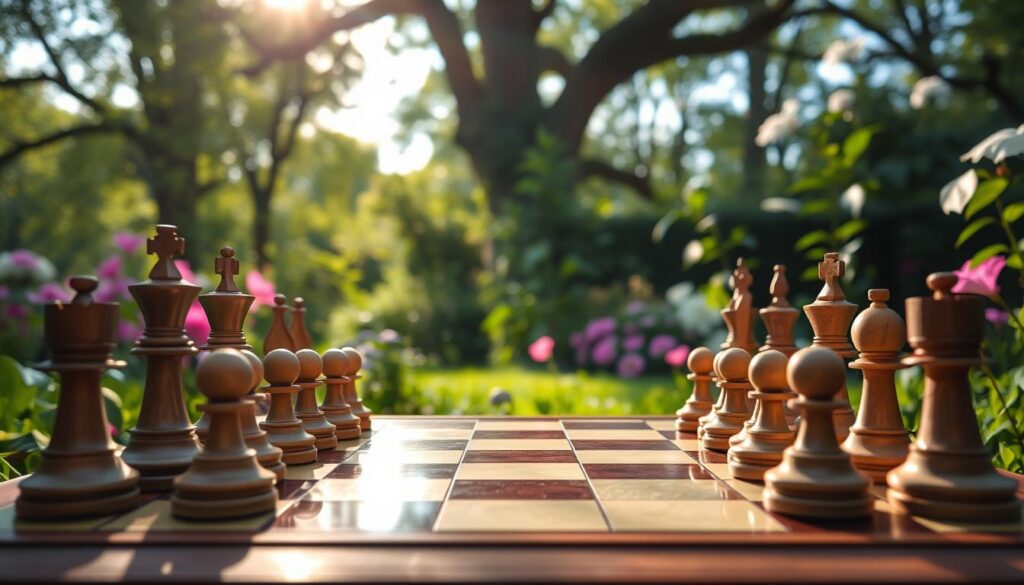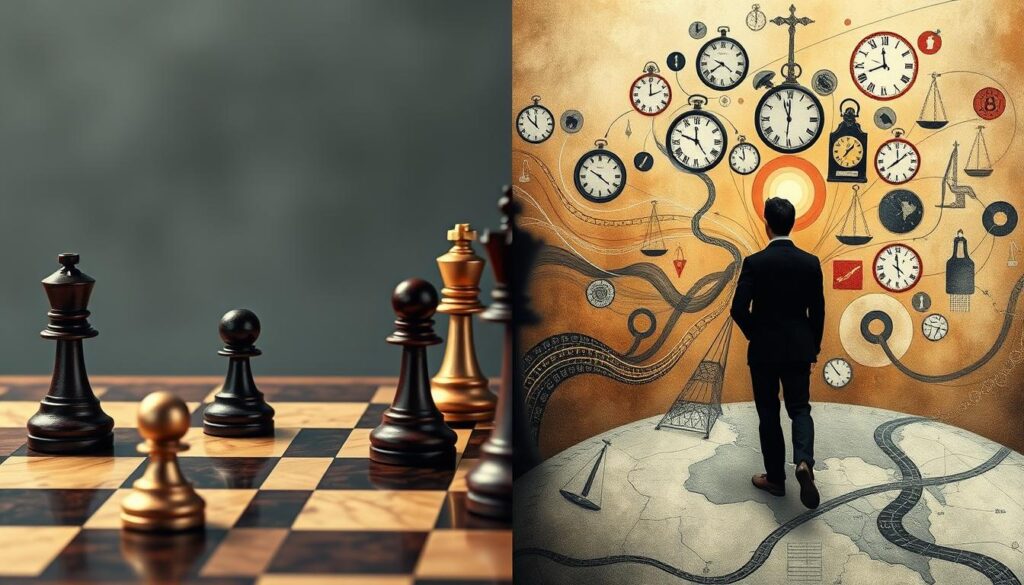-Best 2 out of 3-

“In life, as in chess, forethought wins.” — Charles Buxton
Chess is more than a game. It’s about strategy and making smart choices. Famous people like Napoleon and Bill Gates love it. They see chess as a way to think ahead and solve problems.
Chess teaches us to plan for the future and adapt to now. Every move can help or hurt us. It’s like life, where our choices shape our path.
Great chess players don’t win all the time. But they learn from losing and stay patient. They make big sacrifices to win, just like in life.
Learning chess is like learning to live well. It teaches us to think like others, see patterns, and stay calm under pressure. Every choice we make shapes our future, just like in chess.
Key Takeaways
- Chess teaches the critical importance of a long-term life strategy.
- Every move in chess, as in life, has significant consequences.
- Top players learn more from their losses, underscoring resilience and growth.
- The game emphasizes the necessity of patience and strategic sacrifices.
- Handling pressure effectively is crucial both on the chessboard and in real life.
The Importance of Strategy in Chess and Life
Success in life is like winning at chess. It needs a good strategy. Knowing the rules and planning are key.
This is like thinking ahead in chess.

Developing a Long-Term Plan
Chess and life both value long-term goals. In chess, players aim to improve by facing better opponents. In life, we set big goals and work hard to reach them.
Emanuel Lasker said to think of other options before acting. This is like moving a pawn to become a queen. It shows the value of patience and hard work.
Adapting to Challenges
Being flexible is important in chess and life. Chess helps kids think better and make smart choices. It teaches them to adapt and plan well.
Good teams are creative and flexible. They do well because they can change and grow. By learning and adapting, we can overcome any challenge.
Learning from Every Move
Chess and life teach us through every step. We learn from wins and losses. This helps us grow and get better.
One person went from losing quickly to becoming great. This shows the power of keeping trying and learning. By learning from every experience, we can win in life and chess.
Strategy and Patience — Both in Chess and in Life
Chess and life need strategy and patience. Every move in chess is like every life decision. They both need careful thought to get through tough times.
Top chess players face tough opponents often. This makes them better and teaches them to never give up. They learn to think fast and change plans quickly.

In life, we face ups and downs like chess. We must think and wait patiently. When things go wrong, we keep going and change our plans.
Being careful and planning is key in chess and life. Famous people like Bill Gates and Elon Musk say chess helped them think better. It teaches us important life lessons.
Chess and life both teach us to keep trying and think ahead. We should try different things before making big choices. This helps us avoid making hasty decisions.
| Focus Area | Chess | Life |
|---|---|---|
| Strategic Planning | Each move is calculated and serves a larger goal. | Long-term goals require careful planning and patience. |
| Adaptability | Players adapt to the opponent’s moves. | Individuals must adapt to changing circumstances. |
| Perseverance | Persistence is needed to improve and succeed. | Continuous effort leads to achieving goals. |
| Mental Resilience | Maintaining composure under pressure is crucial. | Mental strength is needed to handle life’s challenges. |
| Learning and Growth | Analyzing moves and outcomes for improvement. | Learning from experiences to foster personal growth. |
Chess and life show us the power of strategy and patience. These are key in both. With careful planning and never giving up, we can do great things.
Decision-Making Skills: From the Chessboard to Real Life
Learning to make decisions from chess to real life needs deep thinking. Chess players learn to look at many options to stay ahead.
This skill helps in making smart choices in everyday life.

Analyzing Options
In chess, picking the right move is key. Each choice can change the game’s direction. This skill helps in real life too, where we must pick the best path.
Companies like Apple value people who can think ahead. They can tackle tough projects and stay ahead of the competition.
Understanding Consequences
Chess teaches the value of knowing what happens next. Players think about the future of each move. This skill is vital in solving problems and making plans.
Chess players learn from their mistakes. They review their games to get better. This helps in making smarter choices in life.
| Skills | Chess | Real Life |
|---|---|---|
| Planning | Evaluating several moves ahead | Setting long-term goals and steps |
| Adaptability | Adjusting to the opponent’s unexpected moves | Responding to new challenges and opportunities |
| Learning from Mistakes | Reviewing and improving past games | Analyzing past decisions to improve future outcomes |
Success in life depends on understanding our choices. Chess improves focus, patience, and thinking. It teaches us to make careful choices in all parts of life.
Mental Fortitude and Perseverance in Chess
In chess and life, being strong mentally and never giving up is key. These skills help us deal with tough times and beat challenges. When we face big opponents or make important choices, staying calm and confident is crucial.
Studies by de Groot (1965) show that chess masters can stay focused for up to six hours. This is amazing and shows their great attention skills.
Handling Pressure Situations
Playing chess uses important parts of our brain, like the prefrontal cortex and parietal lobes. Burgoyne et al. (2016) found that top chess players can focus better. This skill helps them stay calm in tough games.
Learning to handle pressure in chess helps us in life too. It teaches us to stay calm and keep going, even when things get hard.
Building Resilience
Building resilience in chess means learning from mistakes and moving forward. Grandmasters, as Gobet and Simon (1996) discovered, think deeply about their moves. This careful thinking helps them bounce back from failures.
Playing chess keeps our minds sharp and can even help prevent Alzheimer’s Disease. It also makes us better at solving problems and dealing with boredom.
Chess teaches us to be strong mentally and never give up.
These skills help us face life’s challenges and grow. They lead to success in the end.
–Click here if you ⇒ WANT TO PLAY-


